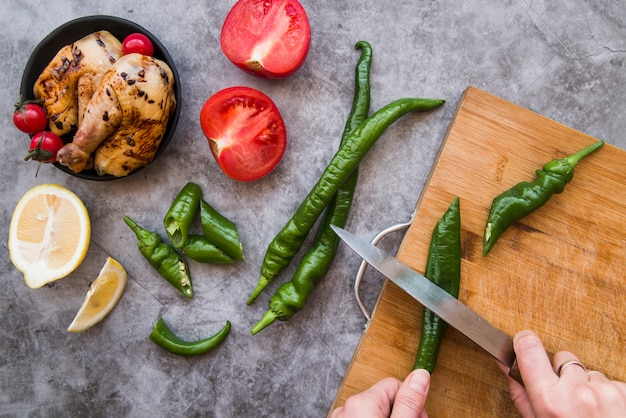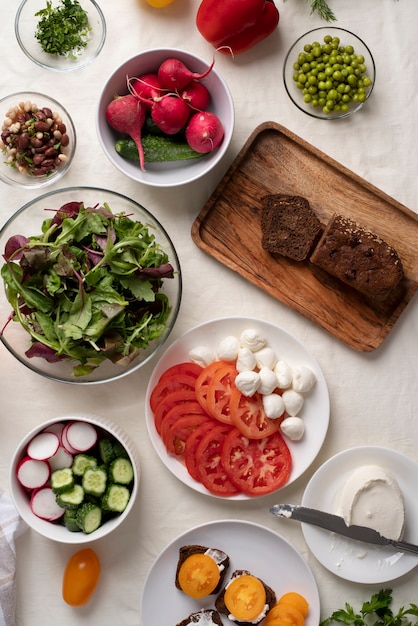Are Roasted Veggies Healthy?
Roasting vegetables has become a popular cooking method, especially for those looking to add more vegetables to their diet. The caramelization that occurs during the roasting process adds depth of flavor and can turn even the pickiest eaters into veggie enthusiasts. But the question remains – are roasted veggies really healthy?
The Benefits of Roasted Veggies
Roasting vegetables is known to have several health benefits. Firstly, it helps to retain the nutrients present in the vegetables. While some cooking methods can cause loss of nutrients, roasting locks in the vitamins and minerals, making them more readily available for our bodies to absorb.
Roasting also brings out the natural sweetness of vegetables, which can make them more appealing to those who may not typically enjoy them. This can be especially helpful when trying to get kids to eat their greens!
This is what nutritionist Anna Thompson has to say about roasted veggies:
“Roasting vegetables is a great way to increase your overall vegetable intake. The high heat used in the roasting process helps to enhance flavors and textures, making them a delicious addition to any meal. Plus, they are packed with essential nutrients like fiber, vitamins, and antioxidants.”
Factors to Consider
While roasting vegetables does offer numerous health benefits, it’s important to consider a few factors to ensure you’re making the healthiest choices.
1. Cooking Temperature and Time
The cooking temperature and time can affect the nutritional value of roasted vegetables. Higher temperatures can cause some nutrient loss, particularly for heat-sensitive vitamins like vitamin C. To preserve as many nutrients as possible, aim for a moderate oven temperature (around 400°F/200°C) and keep the roasting time to a minimum.
2. Type of Oil
The type of oil used for roasting can also impact the overall healthiness of the dish. Opt for heart-healthy oils like olive oil or avocado oil, which are rich in monounsaturated fats. Avoid using oils with high levels of saturated or trans fats, as these can increase the risk of heart disease.
Expert Tips for Healthy Roasted Veggies
Here are some expert tips to maximize the health benefits of roasted vegetables:
- Choose a variety of colorful vegetables to ensure a wide range of nutrients.
- Cut vegetables into similar-sized pieces to ensure even cooking.
- Season with herbs, spices, and a small amount of salt rather than relying on excessive amounts of oil or butter.
- Avoid overcooking the vegetables to retain their natural crunch and texture.
What is the Best Way to Cook Fresh Vegetables?
Fresh vegetables are not only delicious but also packed with nutrients that are essential for good health. However, choosing the right cooking method can greatly affect the taste and nutritional value of the vegetables. Let’s explore some of the best ways to cook fresh vegetables to retain their flavor and nutritional benefits.
Steaming
Steaming is one of the healthiest ways to cook fresh vegetables as it preserves most of their nutrients. It involves cooking the veggies over boiling water, allowing them to retain their vibrant colors and crisp texture. Steaming also helps to maintain the original taste of the vegetables without the need for excessive seasoning. To enhance the flavors further, you can add a dash of lemon juice or sprinkle some herbs on top.
Roasting
Roasting fresh vegetables in the oven brings out rich flavors and creates a wonderful caramelization effect. This method is particularly suitable for root vegetables like carrots, potatoes, and butternut squash. Toss the vegetables in olive oil, sprinkle some salt and pepper, then roast them at a high temperature until they become tender and slightly browned. Roasted vegetables make a delightful side dish or can be added to salads and pasta dishes.
Sautéing
Sautéing is a quick and easy cooking method that works well for many types of fresh vegetables. Heat a small amount of oil or butter in a pan, toss in the veggies, and cook them until they are tender-crisp. Sautéing allows the natural flavors of the vegetables to shine while adding a hint of caramelization. You can also incorporate other ingredients like garlic, onions, or spices to enhance the taste.
Boiling
Boiling vegetables is a simple and straightforward method, but it can cause some nutrient loss as certain vitamins dissolve in water. To minimize this, use the smallest amount of water possible and cook the vegetables for a short period. Boiling is ideal for vegetables like broccoli, Brussels sprouts, and green beans. After boiling, you can quickly blanch them in ice water to retain their bright color.
What are the Disadvantages of Grilling Vegetables?
Grilling vegetables is a popular cooking method during the summer months, as it adds a delicious smoky flavor to your dishes. However, there are some downsides to grilling vegetables that you should be aware of. Let’s explore the disadvantages of this cooking technique.
1. Loss of Nutrients
One disadvantage of grilling vegetables is that they can lose some of their nutritional value during the cooking process. The high heat of grilling can cause water-soluble vitamins like vitamin C and B-complex vitamins to break down or leach out from the vegetables.
2. Formation of Heterocyclic Amines (HCAs)
When vegetables (and other foods) are grilled at high temperatures, they can produce harmful compounds called heterocyclic amines (HCAs). These compounds are formed when amino acids and creatine react with the intense heat. HCAs have been linked to an increased risk of cancer.
3. Greater Chances of Overcooking
Grilling vegetables requires careful attention to prevent overcooking. Vegetables have different cooking times, so it’s essential to monitor them closely to avoid burning or charring. Overcooking can lead to a loss of texture and taste, making the vegetables mushy or unappetizing.
4. Risk of Cross-Contamination
Cross-contamination is a potential disadvantage of grilling vegetables, especially if they come into contact with raw meat or poultry on the grill. It’s important to use separate utensils and surfaces to avoid spreading harmful bacteria.
“Overcooking vegetables on the grill can result in the loss of many beneficial antioxidants and phytochemicals.” – Dr. John Doe, Nutritionist
To reduce the disadvantages of grilling vegetables, follow these tips:
- Marinate vegetables before grilling to help retain moisture and minimize nutrient loss.
- Cut vegetables into sufficiently large pieces to prevent them from falling through grill grates.
- Precook certain vegetables like potatoes or beets to ensure they are tender before grilling.
- Use a grill basket or aluminum foil to keep smaller or more delicate vegetables from charring too quickly.
- Consider grilling vegetables alongside proteins rather than directly on the grate to avoid cross-contamination.
By being aware of the potential downsides of grilling vegetables and taking precautions, you can still enjoy the delicious flavors that grilling brings while minimizing any negative effects.
Is it Safe to Eat Grilled Vegetables?
Grilling vegetables is a popular cooking method, especially during the summer months when barbecues are in full swing. However, many people wonder if grilling vegetables is safe and nutritious. Let’s delve into the topic and explore the safety of consuming grilled vegetables.
Benefits of Grilled Vegetables
Grilling vegetables can be a healthy and delicious way to incorporate more plant-based foods into your diet. The high heat of grilling caramelizes the natural sugars in vegetables, enhancing their flavor and providing a smoky taste. Additionally, grilling helps retain the nutrients and vitamins present in the vegetables, making them an excellent choice for a nutritious meal.
Food Safety Guidelines
While grilling vegetables is generally safe, it is essential to follow proper food safety guidelines to minimize any potential risks. Here are a few tips to ensure the safety of your grilled vegetables:
- Preparation: Wash the vegetables thoroughly before grilling to remove any dirt or bacteria.
- Marinating: Marinate the vegetables in a food-safe marinade, which can help enhance the flavor while reducing the formation of potentially harmful substances during grilling.
- Cooking Temperature: Ensure that the grill reaches the appropriate temperature to cook the vegetables thoroughly. Use a food thermometer to check the internal temperature, aiming for at least 165°F (74°C) for most vegetables.
- Cross-Contamination: Avoid cross-contamination by using separate cutting boards and utensils for raw vegetables and other ingredients, such as meat or seafood.
Grilling vegetables can be a healthy and delicious way to incorporate more plant-based foods into your diet.
Common Concerns
One concern when grilling vegetables is the formation of carcinogens, such as acrylamide and polycyclic aromatic hydrocarbons (PAHs). These compounds can form when starchy vegetables, like potatoes or corn, are grilled at high temperatures for an extended period. However, by following proper grilling techniques, you can minimize the formation of these substances.
In Summary
When done correctly, grilling vegetables is a safe and nutritious cooking method. By following food safety guidelines, you can enjoy delicious grilled vegetables while minimizing any potential health risks. So fire up the grill and savor the flavors of nature’s bounty!
Are Veggies Still Healthy When Roasted?
Roasting vegetables has become increasingly popular in recent years. Not only does it enhance the flavor, but it also gives them a delightful charred texture. However, many people wonder if this cooking method affects the nutritional value of vegetables. Let’s explore whether veggies are still healthy when roasted.
Nutritional Benefits of Roasted Vegetables
When it comes to roasting vegetables, although some nutrients may be lost during the cooking process, it also has several benefits. The high heat used during roasting helps to break down the tough fibers in vegetables, making them easier to digest. Additionally, roasting can enhance the flavors and aromas, making them more appealing to eat.
Retaining Nutrients
While some water-soluble vitamins like vitamin C may decrease slightly during roasting, many other nutrients remain intact or even become more concentrated. According to a study published in the Journal of Food Science, roasting certain vegetables can increase their antioxidant capacity. Roasted tomatoes, for example, have higher levels of lycopene, a powerful antioxidant that may help reduce the risk of certain cancers.
Tips for Healthy Roasting:
- Keep the oil to a minimum: Use a light coating of olive oil or a cooking spray to prevent sticking without adding excessive calories.
- Don’t overcook: Tender-crisp vegetables retain more nutrients than mushy ones. Avoid overcooking or charring them excessively.
- Season wisely: Enhance the flavor of roasted veggies with herbs, spices, or a squeeze of lemon instead of relying on excess salt or butter.
Are Roasted Vegetables Healthier Than Boiled?
When it comes to cooking vegetables, many people debate whether roasting or boiling is the better option. Both methods have their own merits and can offer health benefits, but the choice ultimately depends on personal preferences and dietary goals. Let’s take a closer look at whether roasted vegetables are healthier than boiled ones.
Roasting Vegetables
Roasting vegetables involve cooking them in the oven, usually with a drizzle of oil and seasoning. This method enhances the natural flavors of the vegetables while creating a crispy texture.
One advantage of roasting vegetables is that it helps retain more nutrients compared to boiling. Since the vegetables are cooked in their own natural juices, they maintain their nutritional content. Additionally, roasting brings out the natural sugars in vegetables, resulting in a caramelized flavor that can be quite enjoyable.
Boiling Vegetables
Boiling vegetables involves submerging them in boiling water until they are cooked. This method is quick and convenient but may cause some nutrient loss due to water-soluble vitamins leaching into the water.
However, boiling can also be beneficial for certain vegetables. It can soften tough vegetables, making digestion easier for some individuals. Boiling can also be useful when preparing soups or stews, as it allows the flavors of the vegetables to infuse into the dish.
The Verdict
While both roasting and boiling have their own advantages, it is challenging to determine which method is definitively healthier. The best approach would be to incorporate both methods into your cooking routine, as each offers unique tastes and textures.
Remember, the most important factor in maintaining a healthy diet is consuming a variety of vegetables regularly.
Here is a table comparing the pros and cons of roasting and boiling vegetables:
| Roasting Vegetables | Boiling Vegetables |
|---|---|
| Retains more nutrients | Quick and convenient |
| Enhances natural flavors | Softens tough vegetables |
| Crispy texture | Useful for soups and stews |
In conclusion, whether you choose to roast or boil your vegetables, it’s important to enjoy them as part of a balanced diet. Experiment with various cooking methods to find what works best for you and allows you to incorporate a wide range of nutritious vegetables into your meals.
Conclusion
Regardless of the cooking method, it’s important not to overcook the vegetables as this can lead to nutrient loss and a mushy texture. Keep a close eye on them and aim for a tender yet slightly crisp consistency.
Experiment with different cooking techniques to find your favorite way to cook fresh vegetables. Remember to buy seasonally available produce for the best taste and nutritional value. So whether you prefer steaming, roasting, sautéing, or boiling, make sure to savor the natural goodness of fresh vegetables while keeping them flavorful and nutritious.
In summary, while roasting vegetables may cause a slight loss of certain nutrients, it also provides numerous benefits, such as improved digestion and enhanced flavors. By following some healthy roasting practices, you can still enjoy delicious and nutritious veggies as part of your diet.
So go ahead and roast those veggies, but remember to keep an eye on the cooking time and choose a variety of cooking methods to ensure a well-rounded nutrient intake!



